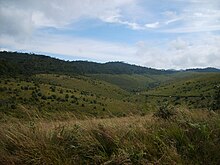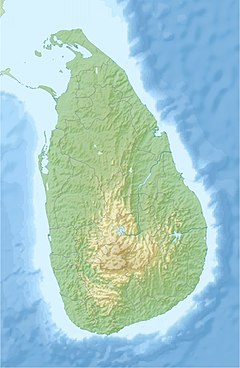Horton Plains
| Horton Plains National Park in Ohiya | |
|---|---|
|
IUCN category II (national park)
|
|

World's End, a sheer precipice within the park
|
|
| Location | Central province, Sri Lanka |
| Nearest city | Ohiya and Nuwara Eliya |
| Coordinates | 6°48′N 80°48′E / 6.800°N 80.800°ECoordinates: 6°48′N 80°48′E / 6.800°N 80.800°E |
| Area | 3,160 ha (12.2 sq mi) |
| Established | 1969 (Nature reserve) 1988 (National park) |
| Governing body | Department of Wildlife Conservation |
| World Heritage Site | 2010 (within the site Central Highlands of Sri Lanka) nv |
 |
|
| UNESCO World Heritage Site | |
|---|---|
| Location | Sri Lanka |
| Coordinates | 6°48′N 80°48′E / 6.8°N 80.8°E |
| Criteria | ix, x |
| Reference | 1203 |
| Inscription | 2010 ( Session) |
|
[]
|
|
Horton Plains National Park is a protected area in the central highlands of Sri Lanka and is covered by montane grassland and cloud forest. This plateau at an altitude of 2,100–2,300 metres (6,900–7,500 ft) is rich in biodiversity and many species found here are endemic to the region. This region was designated a national park in 1988. It is also a popular tourist destination and is situated 8 kilometres (5.0 mi) from Ohiya, 6 kilometres (3.7 mi) from the world famous Ohiya Gap/Dondra Watch and 32 kilometres (20 mi) from Nuwara Eliya.
The Horton Plains are the headwaters of three major Sri Lankan rivers, the Mahaweli, Kelani, and Walawe. In Sinhala the plains are known as Maha Eliya Plains. Stone tools dating back to Balangoda culture have been found here. The plains' vegetation is grasslands interspersed with montane forest and includes many endemic woody plants. Large herds of Sri Lankan sambar deer feature as typical mammals and the park is also an Important Bird Area with many species not only endemic to Sri Lanka but restricted to the Horton Plains. Forest dieback is one of the major threats to the park and some studies suggest that it is caused by a natural phenomenon.
The sheer precipice of World's End and Baker's Falls are among the tourist attractions of the park.
...
Wikipedia


